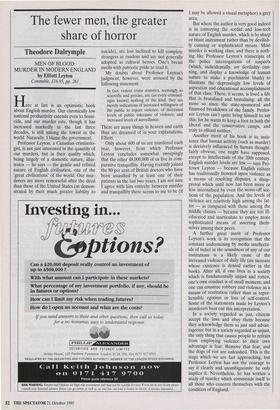The fewer men, the greater share of horror
Theodore Dalrymple
MEN OF BLOOD: MURDER IN MODERN ENGLAND by Elliott Leyton Constable, £16.95, pp. 261 Here at last is an optimistic book about English murder. Our chronically low national productivity extends even to homi- cide, and our murder rate, though it has increased markedly in the last three decades, is still among the lowest in the world. Naturally, I blame the government.
Professor Leyton, a Canadian criminolo- gist, is not just interested in the quantity of our murders, but in their quality which, being largely of a domestic nature, illus- trates — he says — the gentle and refined nature of English civilisation, one of the `great civilisations' of the world. Our mur- derers are more remorseful after the deed than those of the United States (as demon- strated by their much greater liability to suicide), are less inclined to kill complete strangers at random and are not generally adopted as cultural heroes. One's breast swells with patriotic pride to read it.
My doubts about Professor Leyton's judgment, however, were aroused by the following statement: In fact, violent crime statistics, seemingly so scientific and precise, are (as every criminol- ogist knows) nothing of the kind; they are merely indications of increased willingness of the public to report violence, of decreased levels of public tolerance of violence, and increased levels of surveillance.
There are more things in heaven and earth than are dreamed of in your explanations, Elliott.
Only about 600 of us are murdered each year, however, from which Professor Leyton concludes somewhat sweepingly that the other 48,000,000 of us live in com- parative tranquillity. Having recently joined the 80 per cent of British doctors who have been assaulted by at least one of their patients in the last two years, I am not sure I agree with him entirely: between murder and tranquillity there seems to me to be (if I may be allowed a visual metaphor) a grey area.
But where the author is very good indeed is in conveying the sordid and low-tech nature of English murder, which is by sharp or blunt instrument rather than by devilish- ly cunning or sophisticated means. Most murder is working class, and there is noth- ing like Professor Leyton's transcripts of the police interrogations of suspects (which, indicidentally, are devilishly cun- ning, and display a knowledge of human nature to make a psychiatrist blush) to illustrate the depressingly low levels of aspiration and educational accomplishment of that class. There, it seems, is lived a life that is brutalised and brutalising: all the more so since the state-sponsored and financed breakdown of the family. Profes- sor Leyton can't quite bring himself to say this: for he wants to keep a foot in both the liberal and the conservative camps, and truly to offend neither.
Another merit of his book is its insis- tence that human activity (such as murder) is decisively influenced by human thought: fairly obvious, one might have supposed, except to intellectuals of the 20th century. English murder levels are low — says Pro- fessor Leyton — because English culture has traditionally frowned upon violence as a means of resolving disputes, a disap- proval which until now has been more or less internalised by even the worst-off sec- tions of the population. And the levels of violence are relatively high among the lat- ter — as compared with those among the middle classes — because they are too ill- educated and inarticulate to employ more sophisticated means of asserting them- selves among their peers.
A further great merit of Professor Leyton's work is its recognition that the constant undermining by media intellectu- als of belief in the soundness of any of our institutions is a likely cause of the increased violence of daily life (an increase whose existence is denied earlier in the book). After all, if one lives in a society which is fundamentally unjust and rotten, one's own conduct is of small moment; and one can construe robbery and violence as a means of restitution rather than as repre- hensible egotism or loss of self-control. Some of the statements made by Leyton's murderers bear out this interpretation.
In a society regarded as just, citizens accept the laws and obey them because they acknowledge them as just and advan- tageous; but in a society regarded as unjust, the only thing that causes people to refrain from employing violence to their own advantage is fear. Remove that fear, and the dogs of riot are unleashed. This is the stage which we are fast approaching, but Professor Leyton has not the courage to say it clearly and unambiguously: he only implies it. Nevertheless, he has written a study of murder which commends itself to all those who concern themselves with the condition of England.










































































 Previous page
Previous page